How To Easily Get a Certified True Copy in Singapore
- Modified: 15 April 2025
- 10 min read
- Bookkeeping


Heather Cameron
Author
From expert guidance and helpful accounting tips to insights on the latest trends in fintech, Heather is here to empower entrepreneurs and small business owners in Singapore with great content. With a background in digital marketing spanning eight years, she has experience writing for various industries and audiences. As Osome’s copywriter, she’s here to inform and inspire our readers with great storytelling.

Deepti Laddha
Reviewer
Deepti Laddha, our Head of Corporate Operations in Singapore, brings a decade of experience to her role, supporting our business writers in crafting insightful and engaging articles. With a strong background in corporate services, Deepti is a rich source of knowledge and expertise. We can count on her to assist in transforming any definition, concept or complicated jargon into helpful tips that help our readers take their businesses to the next level.
A certified true copy is an official photocopy of a document confirmed to be accurate. You’ll need it in Singapore for legal, academic, and official purposes. This article explains what a certified true copy is, why you need it, and how to get one.
Key Takeaways
- A certified true copy is a photocopy of an original document verified as accurate by an authorised individual, mainly used for legal and administrative purposes when original documents cannot be submitted.
- The process to obtain a certified true copy in Singapore involves identifying the original document, finding an authorised certifier such as notaries public or lawyers, and undergoing the certification process where the certifier verifies and marks the copy.
- Certification and notarisation differ in thoroughness and cost; certification verifies the copy’s accuracy, while notarisation involves a Notary Public validating the document’s contents and is required for documents used internationally, making it more comprehensive and expensive.
What Is a Certified True Copy?
A certified true copy is a photocopy of an original document that has been officially verified as an accurate reproduction by an authorised individual. This process ensures that the certified copy is a true and accurate representation of the original document, which can be crucial for various legal and administrative purposes.
Need assistance with document legalisation and certification? Osome offers comprehensive bookkeeping services to streamline the process and ensure the accuracy of your documents. Let us handle the paperwork while you focus on growing your business.
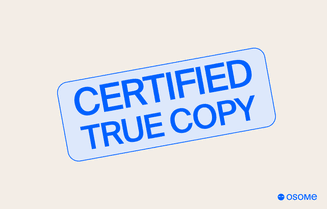
There are situations where original documents cannot be submitted due to impracticality or restrictions, such as legal proceedings, academic applications, and verification processes. In these cases, certified true copies, which prove the authenticity of the originals without risking loss or damage, are usually required.
Certified true copy meaning
A certified true copy is a precise duplicate of the original document authenticated by an authorised individual. This is done by comparing the photocopied document to the original for accuracy. After verification, the certifier substantiates the copy by signing and affixing an official stamp or seal, thus endorsing it as a true and accurate representation of the original.
Common uses of certified true copies
Certified true copies are typically used in legal or administrative contexts. They are required for verifying identification papers, academic certificates, and other legal documents and are commonly used in legal proceedings, administrative tasks, academic applications, and verification processes.
For instance, when applying for a visa, schools or universities might require certified true copies of academic transcripts and other personal documents to ensure their authenticity without needing the originals.
3 Easy Steps to Obtain a Certified True Copy
The process to obtain a certified true copy in Singapore is straightforward when you adhere to these steps:
- Begin by pinpointing the original document you need to certify.
- Look for an authorised person to carry out the certification.
- The final step involves the certification process, in which the certifier verifies and marks the copy as certified.
Let's dissect these steps further to clearly understand the entire process.
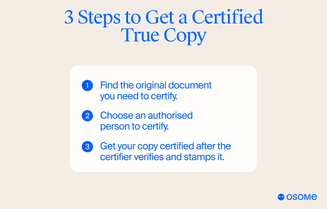
Identifying the Original Document
The first step is identifying the original document needing certification. The original document, such as a birth certificate, must be valid, unaltered, and in its complete form to be eligible. Common items often requiring certification include the following documents: identification papers, academic certificates, and legal documents.
Before starting a business in Singapore, entrepreneurs must obtain a Business Profile from the Accounting and Corporate Regulatory Authority (ACRA). Once complete and certified by an ACRA official, this crucial document is a prerequisite for legalisation at the Singapore Academy of Law (SAL), a necessary step for utilising the document overseas.
Finding an authorised person to certify
In Singapore, only specific individuals and organisations can certify true copies. These include:
- Notaries public
- Lawyers
- Certified public accountant professionals
- Government officials
- Justices of the Peace
Notaries public, qualified lawyers appointed to witness the signing of documents and certify copies as true, play a crucial role in providing notarial services.
Banks may also have the authority to certify true copies of identity documents for their customers.
Certification process
The certification process involves:
- Presenting the valid original document along with its photocopy to the certifier.
- The certifier will compare the copy to the original to ensure they are identical.
- If satisfied with its authenticity, the certifier will affix their signature and official stamp or seal onto the copy of the document, marking it as a certified true copy.
Notarisation vs. Certification
It’s vital to understand the difference between notarisation and certification. Certification typically focuses on verifying that a copy of a document is a true and accurate reproduction of the original. In contrast, notarisation requires a registered Notary Public to verify a document's contents and authenticity, making it a more thorough and often more expensive process.
Notarisation is generally required for documents that will be used internationally, as it involves additional steps such as verifying the individual’s identity and witnessing the signing of documents. Conversely, certification is usually sufficient for documents intended for use within the same country.
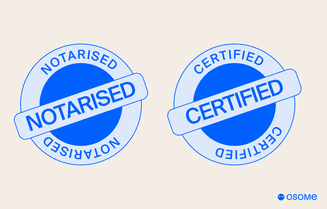
What is a notarisation?
Notarisation is a process in which a notarised document is certified as authentic or validly executed by a notary public. This step is significant in legal and business transactions. In Singapore, this process includes needing to provide documents such as photographic ID and proof of address to verify your identity. A Notary Public or a qualified lawyer will compare the copy to the original document and certify it with their seal and signature to confirm it is a true copy.
After verification, the Notary Public stamps the notarised document to affirm its validity.
Key differences between notarisation and certification
The key differences between notarisation and certification lie in their thoroughness and cost. Certification is quicker and focuses solely on verifying that a copy is a true and accurate representation of the original document.
However, notarisation involves a Notary Public validating the information within the document, which often necessitates additional authentication steps, making it a more comprehensive and costly process.
Where To Get Documents Certified in Singapore
There are several places in Singapore where you can get your documents certified. For example, law firms, the Singapore Academy of Law (SAL), and other authorised bodies like banks offer these kinds of services. Understanding where to go can streamline the process and ensure your documents are certified accurately and efficiently.

Let’s delve deeper into these options.
Law firms and notaries public
In Singapore, law firms and public notaries offer certification services. Lawyers and public notaries are authorised to certify true copies under Singapore law. These professionals are well-versed in the legal requirements and can provide the necessary certification.
Singapore Academy of Law (SAL)
The Singapore Academy of Law (SAL) offers notarial and authentication services. The SAL appoints practising advocates and solicitors with at least seven years of experience as public notaries.
Additionally, notarised documents in Singapore often require further authentication by the SAL, which provides a notarial certificate bearing the notary’s signature, stamp, and seal.
Other authorised bodies
Other authorised bodies, such as corporate secretaries, banks and commercial organisations, can certify true document copies. For example, banks may certify true copies of identity documents for their customers, and chambers of commerce can certify commercial documents before they are legalised.
Required Items for Certification
To get your documents certified, you must provide the original, photocopies, and identification documents. Additionally, the certifier may request other documents to confirm the original document's authenticity.
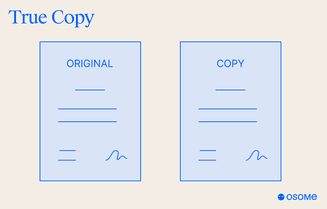
Let’s examine what you need in detail.
Original documents and photocopies
The original document and its photocopy must be presented to the certifier for comparison. The original document must be seen and compared with an exact photocopy to ensure it is a true and accurate representation.
For example, when legalising true copies at SAL, original documents must be submitted, and the staff must make photocopies.
Identity documents
You may need to provide identification documents, the original document, and its copy for certification. Typical identification documents required for verification include NRIC or Passport.
These documents, including statutory declarations, help the person certifying verify the requester's identity and determine the appropriate authentication fee for the online request.
Additional documentation
The person certifying might request additional documents to confirm the original document's authenticity during the certification process. These additional items may vary based on the type of document being certified and the requirements of the certifying authority.
Costs Associated with Certification
The cost of obtaining a certified true copy in Singapore can vary depending on the service provider and the complexity of the document. Understanding these costs can help you budget for the process.
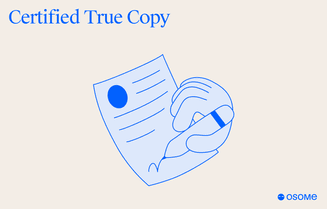
Let’s dissect the standard fees and potential additional charges.
Standard fees
The Notaries Public Rules regulate the fees for certifying documents in Singapore. This means there is a standardised fee structure for various notarial services. It's essential to consult with a notary public or commissioner for oaths directly to get an accurate quote for your specific document and requirements.
Additional charges
Additional charges may apply for complex documents, expedited services, or multiple copies. Notary Publics may charge an extra fee for time spent understanding documents, translation services, and travel time. Express service fees and administrative costs can also add to the overall expense.
For example, there may be extra fees if multiple copies of the document need certification or expedited services are required.
Legalisation of Certified True Copies
Legalisation certifies the genuineness of true copies in other countries, which involves additional processes and costs. This process, known as legalising a document, is crucial for international use of documents and may include obtaining an apostille.
Let’s examine the necessity and methods of getting a document legalised.
Why legalisation is needed?
Legalisation provides an extra layer of certification for documents to be recognised as genuine overseas. Certification is typically used for documents intended for use within the same country, while notarisation and legalisation are required for documents being used abroad. This process often involves additional steps like obtaining an apostille to confirm the document’s validity.
How to legalise a certified true copy
After certifying the document, the notary public issues a Notarial Certificate, which must be authenticated by the Singapore Academy of Law (SAL) to be valid. Since October 2019, documents requiring notarisation in Singapore must be attached to a Notarial Certificate authenticated by the SAL to enhance document integrity.
Legalisation may also involve verification by relevant embassies, consulates, or high commissions, requiring an authorisation letter.
Cost of legalisation
The cost of legalising a certified true copy in Singapore depends on the type of document and the specific requirements of the foreign country where the document will be used. It varies depending on the document in question and any extra requirements.
Additional costs may apply depending on the requirements of the receiving country and any extra steps involved in the process. For example, these could include photocopying fees orcourier services. Additional courier service costs will be applied if you need to send the document to another country.
Document legalisation requires multiple follow-ups and thorough consideration. Partnering with Osome's professional bookkeeping service can streamline the process and ensure the accuracy of your documents. Contact us today to learn more!
Summary
Obtaining a certified true copy in Singapore is a systematic process that involves presenting the original document, finding an authorised certifier, and going through the certification process. Understanding the differences between certification and notarisation and knowing where to get your documents certified can simplify the process.
By following the guidelines in this article, you can ensure that your documents are certified accurately and efficiently, saving you time and avoiding unnecessary hassle. Whether you need a certified copy for legal matters, academic applications, or international use, being well-informed will help you navigate the process smoothly.






